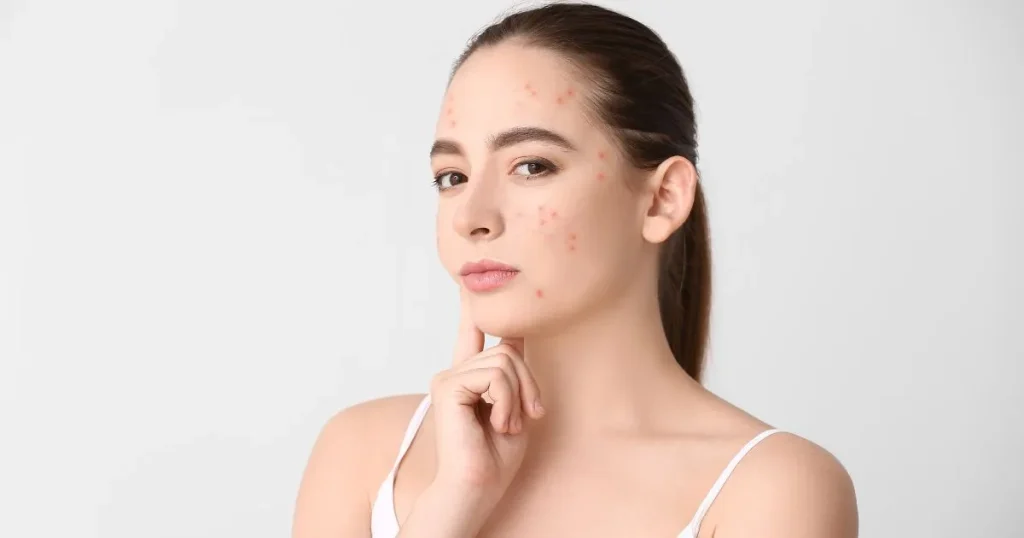If you’re battling stubborn pimples and pesky breakouts, your diet might hold the key to clearer skin. It’s a dermatological old tale—the food we eat is intricately linked with the health of our skin. For many, the idea that certain foods can trigger acne and other skin woes might be new, leading us to look closer at our everyday diet. Here’s a detailed rundown of the eleven foods that cause acne. These are the most surprising skin saboteurs hiding in our meals.
It’s no secret that good nutrition is the building block for good health, including the health of our largest organ—our skin. However, pinpointing the exact dietary culprits leading to breakouts can be more complex than it seems. Our diets are as unique as our genetic makeup; what may cause skin flare-ups for one person might not affect another.
People who are concerned about their health and want to have clear skin might find this subject interesting. Teenagers who often experience acne can improve their skin by adjusting their diet. Skincare enthusiasts who know a lot about topical treatments may discover that the secret to clear skin also lies in their pantry. To make it easy to understand, we have kept the information short and to the point.
Foods That Cause Acne and Bad Skin
Here are the top eleven foods commonly consumed by many, which may inadvertently aggravate skin issues.
1. Greek Yogurt
Greek yogurt can be a double-edged sword for your skin, often touted as a health food high in protein and probiotics. For those sensitive to dairy, the high levels of growth hormones and the natural hormones present in milk, particularly skim milk, can increase acne.
Cutting back on dairy products, such as Greek yogurt, might help some people improve their complexion. Studies have found that eating dairy can cause an overproduction of oil, which can clog pores and lead to breakouts. Researchers are still studying why this happens.
2. Shrimp
Shrimp and other shellfish can have detrimental effects on some people’s skin due to their high levels of iodine. Our bodies need iodine for proper thyroid function. Still, excessive amounts can lead to acne, especially in those predisposed to the condition.
If your skin flares up after a seafood feast, it might be worth considering a potential iodine sensitivity as the root cause. Moderation, in this case, is key, and opting for other sources of lean protein could be a wise choice for your skin and overall health.
3. Peanut Butter
If you love peanut butter, keep in mind that some commercial brands may contain added sugars and hydrogenated oils. These ingredients can cause acne-prone skin to worsen. Although peanuts themselves have a low glycemic index, it’s important to check the labels of peanut butter brands to make sure they don’t contain these additives.
Consuming foods with a high glycemic index raises blood sugar levels, triggering the body to produce more insulin. This can lead to inflammation and increased oil production, which are critical factors in the development of acne.
4. Spinach
An unexpected guest on the list, spinach and other high-oxalate greens can cause some individuals acne and other skin issues. Oxalates, while not problematic for most, can crystallize in body tissues, leading to inflammation, which can manifest in the skin as acne.
This doesn’t mean you should avoid spinach altogether; instead, those predisposed to acne might want to limit their intake. Cooking spinach can help break down oxalates, making them less likely to cause issues for sensitive individuals.
5. Whole Wheat Bread
You might be surprised that your seemingly healthy whole-wheat bread could contribute to your skin concerns. Whole wheat bread, like other high-glycemic carbohydrates, can lead to a spike in blood sugar levels and, subsequently, an increase in acne.
The refining process of grains affects how they are digested, which, in turn, affects blood sugar levels. Swapping out white bread for whole wheat might seem like a good move, but for some, the refined whole wheat could still be problematic for their skin.
6. Kelp
Kelp is known for being a healthy food and a great source of iodine. However, for those who are sensitive to iodine, it can cause acne. This is because kelp supplements and food contain high levels of iodine, which can lead to inflamed skin, especially for people who are already dealing with acne.
As seaweed has become more popular as a health food, the number of people suffering from acne caused by iodine has also increased. If you have skin problems, it is important to be mindful of your iodine intake, including from kelp, to help keep your skin clear.
7. Milk
Milk’s relationship with acne is an age-old controversy. Why is it such a hot-button food for skin health? The dairy product is rich in proteins, particularly whey and casein, which are thought to promote the overproduction of oils in the skin, a common acne culprit. Furthermore, milk has a high glycemic index, which can cause a spike in blood sugar levels, possibly leading to more breakouts.
Several studies have found a correlation between dairy consumption and acne, especially in adolescents. That glass of milk may look innocent, but it could foster the environment for blemishes to thrive.
8. Chocolate
The notion that chocolate gives you breakouts has traditionally been dismissed as an old wives’ tale. However, studies show that the high sugar content in milk chocolate can increase insulin levels, leading to inflammation and an acne flare-up.
A more recent study found that consuming chocolate with a higher percentage of cacao was linked to fewer skin issues, suggesting that it’s not the chocolate per se but the sugar and additives that are the real issue.
9. Salsa
Salsa is often considered a healthy condiment option, but it may not be suitable for people with sensitive skin. This is because tomatoes, a key ingredient in most salsas, are highly acidic and can cause skin inflammation, leading to skin eruptions. If you have sensitive skin, it’s best to avoid consuming too much salsa or acidic foods.
Eating too many high-acid foods can worsen acne breakouts by disrupting the skin’s pH balance. This is because high-acid foods have been linked to an increase in the frequency and severity of acne breakouts.
10. Soda
Sodas are laden with sugar and artificial flavors, particularly the color ones. Combining these ingredients can cause a surge in insulin levels, disrupting the delicate hormonal balance that keeps acne at bay.
Scientific evidence suggests a definitive link between sugary, carbonated beverages and acne. Reducing or eliminating these drinks could lead to clearer skin.
11. Red Meat
Red meat is an everyday dietary staple for many, but it might not do your skin any favors. The high level of saturated fats found in red meat can lead to increased sebum production, which can lead to acne.
Some studies suggest that consuming a lot of red meat may be linked to acne. They recommend reducing the amount of red meat intake to potentially achieve less oily skin and fewer breakouts.
Effects on Skin
The link between diet and skin health is complex, and there isn’t a one-size-fits-all answer. Understanding how these foods might influence your skin is essential to managing acne and achieving a clear complexion.
For many, skin irritation and acne caused by certain foods can be managed or eliminated by adjusting their diet. If certain foods consistently lead to breakouts, they might be better off as occasional treats rather than dietary staples.
Tips for Clearer Skin
Enhancing your diet for better skin doesn’t necessarily mean eliminating entire food groups. It’s about making wiser, skin-friendly choices. Here are a few tips to help get you started on the path to a healthier complexion:
Hydrate with Water
Staying hydrated is essential for maintaining healthy skin. Ditch the sodas and sugary drinks in favor of water to keep your skin looking its best.
Choose Low-GI Foods
Low glycemic index (GI) foods like whole grains and legumes can help manage insulin levels and keep acne at bay.
Lean Towards Whole Foods
If you want to nourish your skin, it’s a good idea to eat a diet rich in whole, unprocessed foods such as fruits, vegetables, lean proteins, and healthy fats. These foods can help your skin from the inside out, so it’s important to make them a part of your regular diet.
Keep a Food Diary
Sometimes, the best way to identify problem foods is to track what you eat and how your skin reacts. A food diary can be a powerful tool for understanding your skin’s needs.
Work with a Dietician or Nutritionist
For personalized advice, consider consulting with a professional who can help you tailor a diet to promote good skin health.
Final Thoughts- Foods That Cause Acne
The condition of our skin often reflects what we eat. Unfortunately, sometimes our eating habits can negatively impact our complexion. By learning how certain food groups impact the skin, we can make informed choices for clearer and healthier skin. Being mindful of what we eat, and how it affects our skin, can improve our overall health and well-being. So, it’s important to choose wisely, and make adjustments as necessary.
The path to a clear complexion is multifaceted. While diet plays a significant role, combining nutritional adjustments with a good skincare routine that includes regular cleansing, moisturizing, and sun protection is essential. Remember, your skin is unique, and what works for one person may not work for another. Finding the right balance may take some time and a little experimentation. Still, the results of a clearer, healthier complexion are well worth the effort.
Frequently Asked Questions
What are the main foods that can cause acne and bad skin?
Foods like shrimp, kelp, Greek yogurt, peanut butter, whole white bread, salsa, etc, are known to contribute to acne and skin issues.
How does sugar contribute to acne and bad skin?
Sugar can spike insulin levels, increasing oil production in the skin and clogged pores, resulting in acne breakouts.
Can dairy products worsen acne and skin problems?
Dairy products can sometimes cause acne to worsen by increasing oil production and inflammation in the skin. This happens due to the hormonal changes they can trigger.
Are there specific types of processed foods that can cause acne?
Processed foods high in refined carbohydrates, artificial additives, and trans fats can contribute to acne by disrupting hormonal balance and promoting inflammation.
Do greasy or fried foods directly cause acne?
While greasy and fried foods may not directly cause acne, they can exacerbate existing acne by increasing oil production and clogging pores.
How long does it take for dietary changes to improve acne and skin health?
It varies for each individual, but making healthier dietary choices can lead to noticeable acne and skin health improvements within a few weeks to months.
Can avoiding these foods completely clear up acne and bad skin?
While avoiding acne-triggering foods can help improve skin condition, following a balanced diet, maintaining good skincare habits, and consulting a dermatologist for personalized advice are essential.
Are there any specific vitamins or supplements that can help improve skin health and prevent acne?
Vitamins A, C, E, and zinc are known for their skin-healing properties. They may be beneficial in reducing acne and promoting healthier skin when included in a well-rounded diet.
- How to Use Aloe Vera for Acne: A Comprehensive Guide - June 1, 2024
- Jojoba Oil for Hair: How to Use for Maximum Benefits - May 19, 2024
- 8 Benefits of Jojoba Oil for Skin: The Ultimate Guide - May 18, 2024



